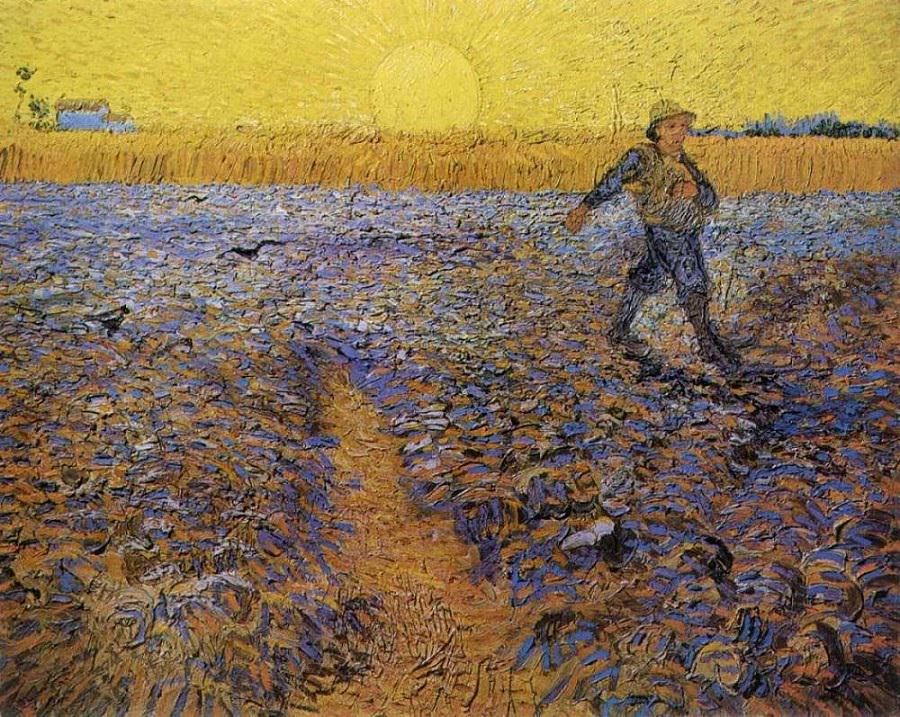[Greek] σπείρω (speirō), [Latin] seminare: to sow, to scatter, to receive seed, to sow seed; Mt.13:3, Mt.25:24, Mk.4:3, Lk.12:24, Jn.4:36, 1Cor.9:11, 1Cor.15:36, 2Cor.9:6, Jas.3:18

Sower at Sunset by Vincent Van Gogh (1888): The sower throwing seeds representing the eternal cycle of agricultural life
Background Information:
Secular Greek: This term means to sow, to create, to scatter, to disseminate, to disperse, to generate, and to beget. Aristotle claimed that spirit was transmitted by the male seed. In Aristophanes’ play Clouds, the poets constantly seek to plant new ideas (seeds) upon the audience. In his other play Birds, he makes reference to orators who plant corrupt ideas. Euripides refers to the break-up (dissolution) of part of the population to other regions.
Old Testament: This term is related to various Hebrew terms. This term is frequently used with slightly varying nuances for the diaspora of the people. The Diaspora is the spreading of the Jews beyond Israel. The seeds aim toward the harvest, salvation, blessing, and positive values. Sowing comes from the direction of God, who has an appointed seedtime and harvest. The focus is on man as the sower and man’s seed in salvation history. You yourselves I will scatter among the nations at the point of my drawn sword (Lev.26:33). I winnowed them with the fan in every city gate (Jer.15:7). Then they shall know that I am the Lord, when I disperse them among the nations and scatter them over foreign lands (Ezek. 12:15). The days are coming, says the Lord, when I will seed the house of Israel and the house of Judah with the seed of man and the seed of beast (Jer. 31:27). All the sown and along the Nile shall dry up and blow away, and be no more (Isa.19:7).
New Testament: This term is prominently used in a literal sense to sow (scatter), which is found in the parable of the sower, the parable of the wheat and weeds, and the parable of the mustard seed. In addition, the seed is referred to the Word and as the one hears the Word. Paul refers to God as one who supplies seed (gifts) and natural needs. Paul also refers to the seed as a body, one’s generosity, and one’s actions. James refers to sowing the fruit of righteousness.
Scripture:
“Make no mistake: God is not mocked, for a person will reap only what he sows.” Gal.6:7
Man wills sow to the flesh or the spirit. One’s actions will have their consequences.
“He proposed another parable to them. ‘The kingdom of heaven is like a mustard seed that a person took and sowed in a field.’” Mt. 13:31
The small sown mustard seed can become a large tree. Small efforts can yield abundant results.
The one who supplies seed to the sower and bread for food will supple and multiply your seed and increase the harvest of your righteousness.” 2Cor.9:10
God is capable of overwhelming generosity. He will provide in abundance, supplying ones’ natural needs.
Seminaries: Originally, this term meant plant nursery or seed plot. First recorded in the 1580’s, this term becomes a school for training priests. Up until the 1930’s, this term was commonly used for any school. The Bethlehem Female Seminary was founded in Germantown Pennsylvania in 1742. The primary task of the seminary was for professional preparation.
Conclusion:
Spore, Diaspora, sporadic, semen, seminal, seminary, seminarian
It was interesting to discover the quite nuanced senses of this term. I suppose one cannot get more nuanced than poets planting seeds (ideas) into the audience’s minds or orators spreading corrupt words.
Even in the simpler Old Testament culture, this term is used in interesting ways. The Old Testament introduces harvesting, winnowing, begetting family lines, and sowing. The man’s seed (ability to procreate/semen) was very important in continuing the family name. Sowing becomes a very important teaching tool in the parables in the New Testament culture. It is interesting to see God as a sower providing an abundance of generosity and natural needs.
As you already know, sporadic means occurring in scattered places (happening at intervals). On some level, some things have not changed. Artistic productions, such as a book, movie, play, or drama, often “throw” provocative ideas (seeds) toward its intended audience. Some people also often “plant” offensive thoughts, ideas, or speech towards others. Many also become offended. Evidently, we already have both.
Seminal means full of possibilities, highly influential, creative, innovative, and original in the sense of having a basis for future development or research.
